#jazz chanteuse
Explore tagged Tumblr posts
Text
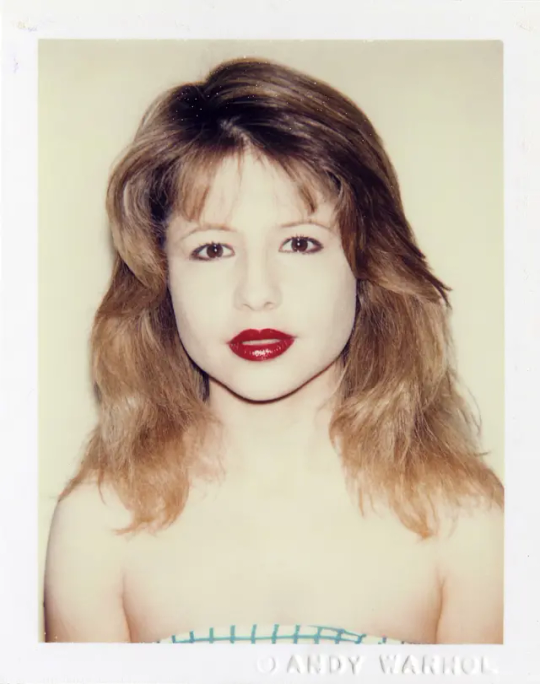
Born on this day 70 years ago: actress, singer, sex kitten, perennial starlet, queen of terrible, terrible movies (like Santa Claus Conquers the Martians and Voyage of the Rock Aliens) and beloved kitsch icon turned credible and durable jazz chanteuse – Miss Pia Zadora (née Pia Alfreda Schipani, 4 May 1954)! For John Waters aficionados, Zadora will always be “Beatnik Girl” in Hairspray (1988): “I play my bongos, listen to Odetta, and then I iron my hair. Dig?” (As Waters raved in his 1987 volume of essays Crackpot, “She’s shorter than Elizabeth Taylor, cuter than Alvin the Chipmunk, richer than Cher, more publicized than Zsa Zsa and has a better hairdo than Farrah.”). Every time I attend the Viva Las Vegas Rockabilly Weekender, I endeavor to make a religious pilgrimage to see Pia’s one-woman cabaret revue in an Italian restaurant called Piero's, where she sings jazz standards in front of a giant Warhol portrait of herself. In April 2019, my friend Kevin and I even got to hang out with her, and she was a savvy, self-deprecating and adorable down to earth blast! I intend to commemorate the occasion by watching Zadora’s 1982 exploitation flick Fake-Out (aka Nevada Heat), which I just discovered is free to stream on both YouTube and Amazon Prime. It’s filmed on location in Vegas (in and around the long-defunct Riviera casino), co-stars Telly Savalas and Desi Arnaz Jr and is directed by Jayne Mansfield’s sexploitation filmmaker ex-husband Matt Cimber. How can I resist? And crank up “When the Rain Begins to Fall” and “The Clapping Song” LOUD! Pictured: Polaroid of Zadora by Andy Warhol, 1983.
#pia zadora#john waters#hairspray#andy warhol#warhol portrait#lobotomy room#kitsch#sex kitten#starlet#jazz chanteuse#las vegas#hairspray the movie#hairspray 1988#beatnik girl#bad movies we love#bad movies for bad people#camp
32 notes
·
View notes
Photo
“… Holiday stood on the bandstand, hardly moving – an elegantly gowned beauty with a gardenia in her pulled-back hair. Holiday’s small, wailing voice revealed a woman who lived for love and would possibly die for it. She both luxuriated in her suffering and gave it dignity, even in “My Man” in which she sang: “He isn’t true / He beats me too / What can I do?” Holiday’s singing was pure autobiography, tied to stylistic quirks that are copied to this day: seductively bent notes that sounded like sighs; a thin, brassy edge that evoked a muted trumpet; a languid delivery that could drag perilously behind the beat yet never fell out of time. Her life was cloaked in tabloid scandal, much of it involving her addictions to heroin and abusive men. She lived her saddest songs to such a reckless degree that she died at forty-four.”
/ From Is That All There Is? The Strange Life of Peggy Lee (2014) by James Gavin /
“I saw the whole world in that face. All of the beauty and all of the misery.”
/ From the documentary Billie (2020) /
Died 65 years ago today: regal, soulful and ravaged jazz chanteuse Billie Holiday (née Eleanora Fagan, 7 April 1915 – 17 July 1959). Lady Day’s bruised but defiant (and sexy as hell) spirit lives every time you listen to her music. My favourite songs of hers will always be “I’m a Fool to Want You”, “Don’t Explain”, “You’ve Changed” and “Good Morning Heartache.” The greatest living interpreter of the Holiday songbook is Joey Arias.
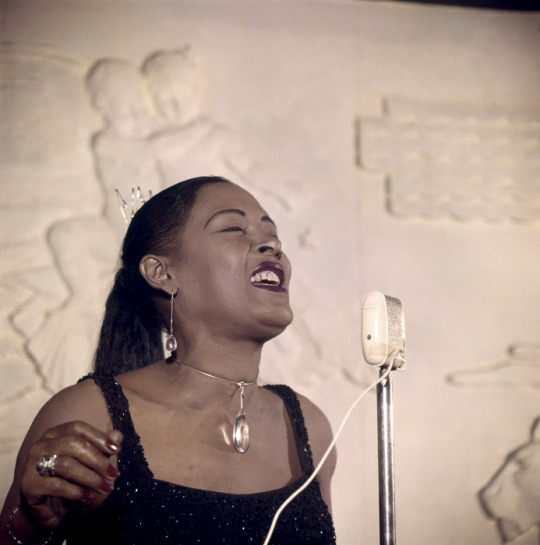
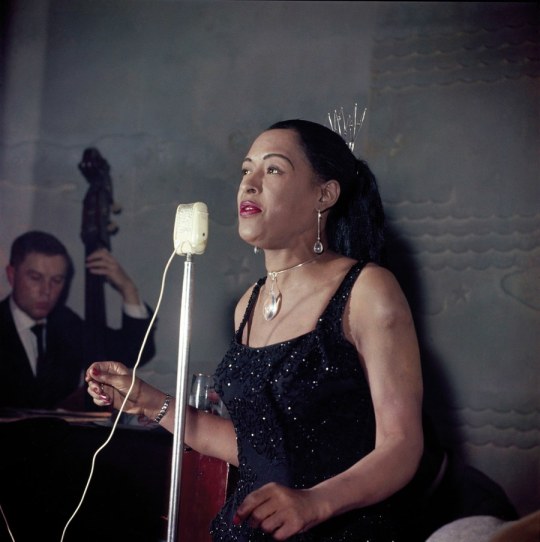
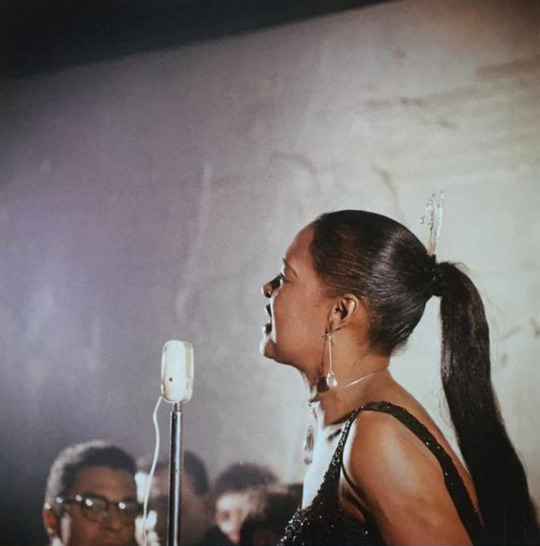
Billie Holiday performing at the Mars Club in Paris on November 20, 1958.
Photos by Jean Pierre Leloir
#billie holiday#jazz#jazz music#jazz diva#jazz chanteuse#lady day#elegance#glamour#ravaged#defiant#kween#fierce#blues music#african american#black glamour
6K notes
·
View notes
Text

Billie Holiday au Downbeat club - New York - Février 1947
Photo de William P. Gottlieb
©Library of Congress
#et pendant ce temps-là#musique#music#jazz#chanteuse#singer#billie holiday#william p. gottlieb#downbeat club#new york#états-unis#usa#02/1947#1947
191 notes
·
View notes
Text
Eddy Mitchell- Ma discothèque
Cadeau à s'offrir ou à offrir !
Idéale Ma discothèque idéale d’Eddy Mitchell est un vrai cadeau fait par Alain Artaud-Macari et Marc Maret, en cette fin d’année, En effet, ils rassemblent dans ce beau livre plus de cinquante références musicales témoignant de la vigueur des références musicales que le chanteur apprécie, de la chanson française à la country en passant par le Rock’Roll qu’il s’est employé à faire connaître en…
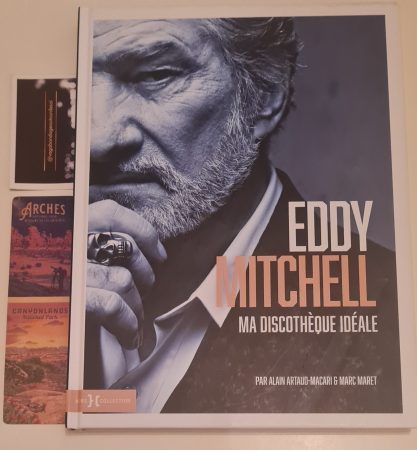
View On WordPress
#Beau livre#Beaux livres#Billet littéraire#Chansons françaises#Chanteur#Chanteurs#Chanteuse#Chanteuses#Chronique littéraire#Chronique livre#Chroniques littéraires#Country#Essai#Jazz#Littérature francaise#Litterature contemporaine#Musique#Musique du XXè siècle#Rock#Rock and Roll#Rock&039;d Roll
1 note
·
View note
Text
Correction bienvenue
L’ancien président états-unien Barack Obama aime faire des recommandations de lectures et de pièces musicales. Parmi ces dernières, il y a souvent du Ella Fitzgerald. En 2015, il y avait «Let It Snow ! Let It Snow ! Let It Snow !» En 2016, 2017 et 2018, rien. En 2019, «How High the Moon». En 2020, rien. En 2021, «Lush Life». En 2022, rien. En 2023, «Cry Me a River» — voilà qui est…
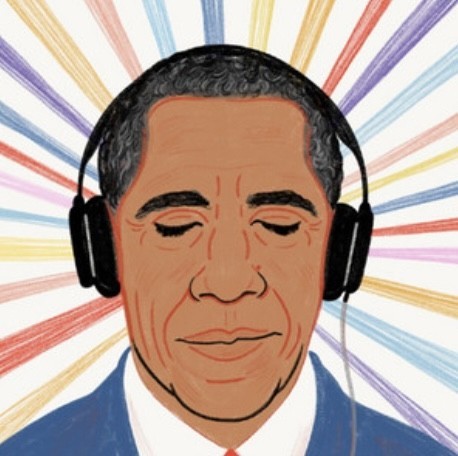
View On WordPress
#barack obama summer playlist#blues#chanson#chanteuse#ella#ella fitzgerald#fitzgerald#jazz#musique#série
0 notes
Text
“There are all kinds of singers. Somehow, Dinah made most of them sound like little girls.” Dan Morgenstern, from the sleeve notes to the 1958 Dinah Washington album Jazz Sides.
“Like Billie Holiday, the singer for whom early in her career she sometimes substituted, Dinah Washington lived a life loaded with drink, drugs and far too many men. Determined to enjoy the opportunities her success brought her she lavished on herself clothes and jewelry; and so, dressed to kill and driving a flashy new car, lived the party life. If she could sing a song of lost love or a rollicking good time, or care off a dirty ditty with eloquent conviction, it was because she knew the experience firsthand. She lived it … she half-talked, half-sang and her style blatantly mixed the sacred music of her background and the profanity of the blues and her raucous mode of life.” Deborah Valentine on Dinah Washington.
Born one hundred years ago today: turbulent jukebox diva Dinah Washington (29 August 1924 - 14 December 1963). One of the first African American superstars to enjoy crossover success on the white pop charts, Washington was financially able to indulge her love of jewelry, furs and sports cars. A defiant and willful tough cookie, she was known to pull out a gun in disagreements. During recording sessions, she would pound back magnums of pink champagne (no wonder her vocals sound so relaxed and effortless! And no wonder – as the liner notes to one of my CDs claims - “records were released that Dinah didn’t even remember making”). I know she’s most beloved for classics like “What a Diff’rence a Day Makes”, “September in the Rain” and her sumptuous, string-drenched version of Noel Coward’s “Mad About the Boy”, but I recommend two heartbreak ballads where Washington drops the trademark bravado to reveal a sensitive, bruised side: “I Want to Cry” (1948) and “You’re Crying” (1956).
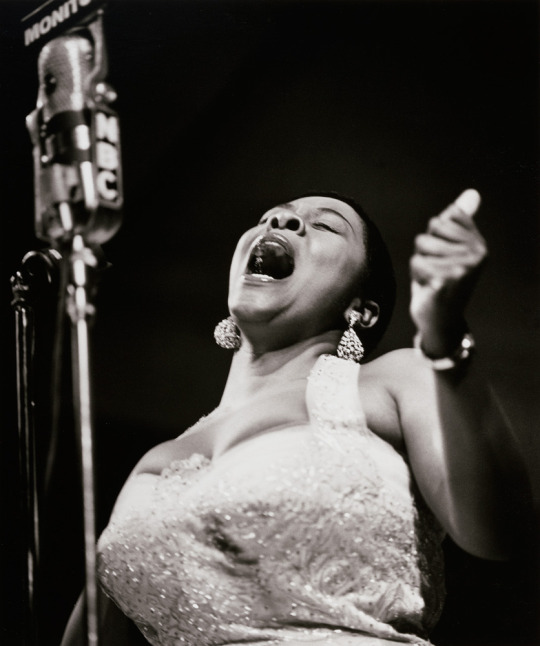
Dinah Washington, Newport, Photo by Herman Leonard, 1955
#dinah washington#herman leonard#rhythm and blues#blues diva#blues music#jazz music#jukebox queen#queen of the blues#black glamour#jazz chanteuse#jazz and blues#lobotomy room
291 notes
·
View notes
Text

Born on this day 90 years ago: sensational Eisenhower era jazz chanteuse, actress and pin-up queen Meg Myles (née Billie Jean Jones, 14 November 1934 – 12 November 2019). For b-movie aficionados, Myles makes an incendiary impression as the leading lady of Satan in High Heels (1962), the apex of early sixties sexploitation cinema NOT made by Russ Meyer. (I screened this tawdry gem at the Lobotomy Room cinema club in July 2024). Even though Satan is black-and-white, you can just tell Myles’ hair is flaming red. (If you squint your eyes, with her curvaceous figure, tight pencil skirts and impressive beehive hairdo, Myles’ silhouette anticipates Joan Holloway in TV’s Mad Men). Inexplicably, despite her tender way with a ballad and scorching charismatic and glamorous performance as the tough as nails anti-heroine Stacey Kane, Myles somehow wasn’t destined for mainstream stardom. (In later years she focused on TV soap operas like The Edge of Night, Search for Tomorrow and All My Children). Now belt out Myles’ BDSM musical number “Female of the Species” from Satan in High Heels along with me: “I'm the kind of woman / Not hard to understand / I'm the kind that cracks the whip / And takes the upper hand …” Satan in High Heels seemingly slipped into public domain years ago and is easy to find and watch for free online. This version is great.
#meg myles#stacey kane#satan in high heels#60s sexploitation#sexploitation cinema#lobotomy room#vintage sleaze#vintage smut#pin up#retro pinup#vintage pin up#redhead#jazz chanteuse#kitsch#soap opera#fierce#glamour#bad girl
12 notes
·
View notes
Text
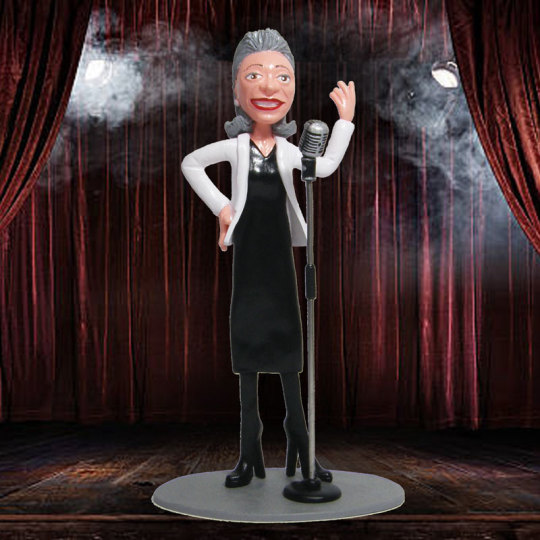
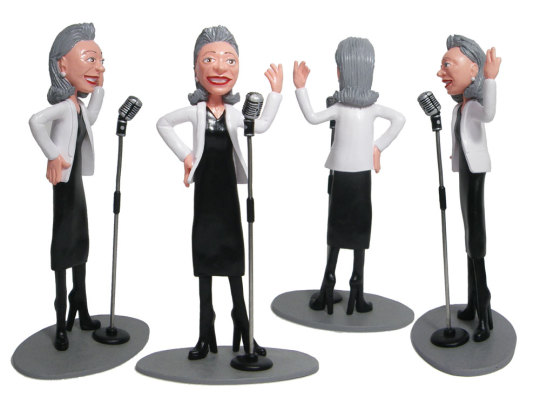
#chanteuse#vinyl figure#action figures#personnalisation#jazz#figurine#figurines#customized#customisation
1 note
·
View note
Text
Movie Musical Divas Tournament: Quarterfinals


Judy Garland (1922-1969) Esther Smith in Meet Me in St. Louis (1944) | Vicki Lester in A Star is Born (1954) | Hannah Brown in Easter Parade (1948) | Susan Bradley in The Harvey Girls (1946) Additional musicals/singing roles include: Strike Up the Band (1940), Little Nellie Kelly (1940), Ziegfeld Girl (1941), Babes on Broadway (1941), For Me and My Gal (1942), A Star is Born (1954), etc.
"i am sure someone else already submitted her but i had to be sure. the icon the ravishing beauty the scrungly little gal." - anonymous
Eartha Kitt (1927-2008): New Faces (1954, Miss Kitt) | St Louis Blues (1958, Gogo Germaine) Additional musicals/singing roles include: The Chastity Belt (1972)
"YES! Even though she faced bewildering amounts of Hollywood racism, the winner of the Hot & Vintage Movie Women Tournament DID manage to do a couple of movie musicals: New Faces, a fluffy backstage-hijinks thing in which she plays her classic chanteuse persona and is even addressed as "Miss Kitt", and St Louis Blues, a musical biopic in which she sings alongside a bunch of other jazz greats. Neither of the films is considered a masterpiece, but Eartha is as scorchingly hot as always, and demonstrates that she could have become a legend in movie musicals if the roles had been there for her. In short, vote for Eartha Kitt because (1) she has JUST ENOUGH credits to count as a movie musical diva, (2) think of all the other Eartha Kitt movie musicals we COULD have had if not for racism, and (3) she's Eartha Kitt, certifiably the hottest old movie woman. Please and thank you." - anonymous
This is Round 5 (quarterfinals) of the Movie Musical Divas tournament. Additional polls in this round may be found by searching #mmround5, or by clicking the link below. Add your propaganda and support by reblogging this post.
ADDITIONAL PROPAGANDA AND MEDIA UNDER CUT: ALL POLLS HERE
Judy Garland:
"I was so surprised to discover that no one has submitted propaganda for Judy Garland yet! Unless the list hasn't been updated, in which case, never mind. But either way, here are some of my favorite Judy moments:
This version of Old Man River hits me square in the feels, holy crapProof that not only was she an unbelievable singer, but she could keep up with both Gene Kelly and Fred Astaire on the dance floor!
She was such an icon and a massive inspiration for me! She definitely deserves to go far in this tournament!!" - @mygreatadventurehasbegun
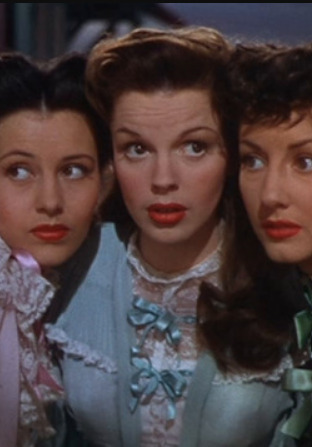
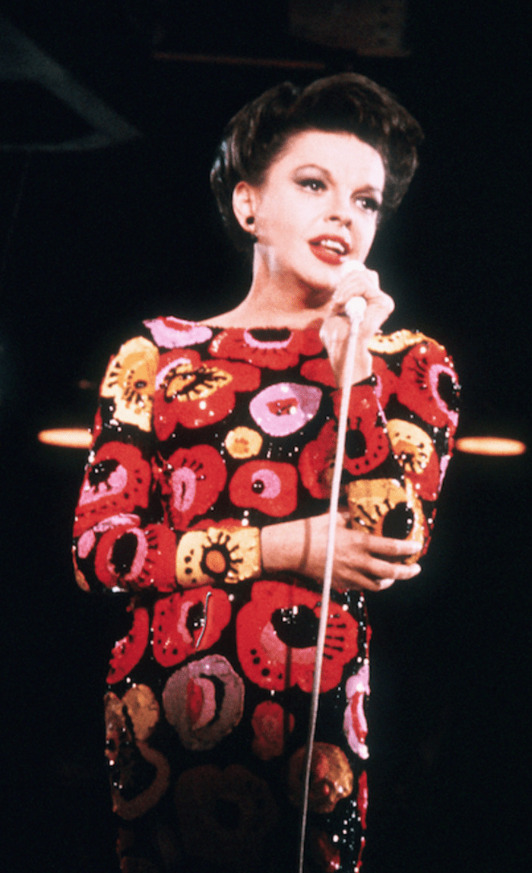
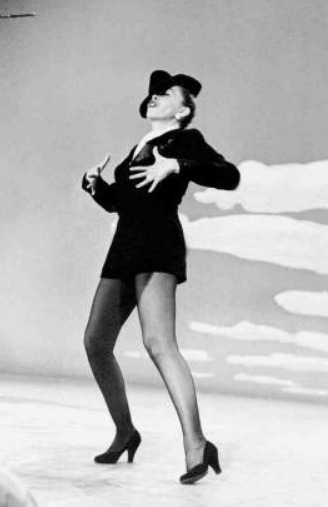
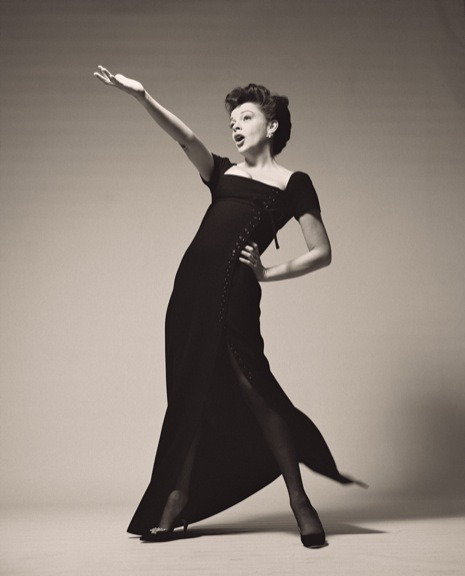
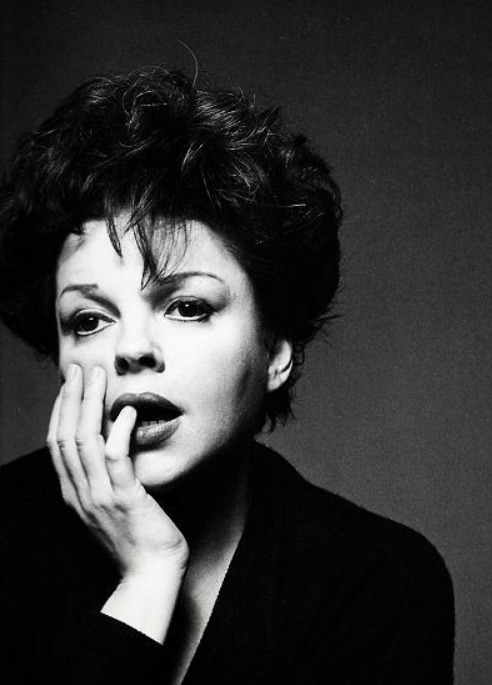
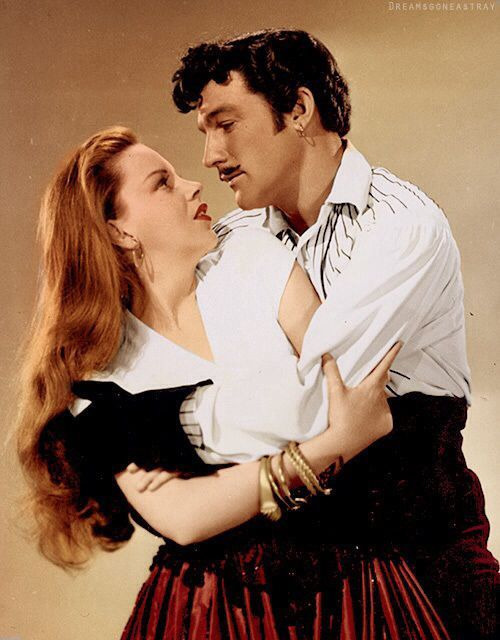
youtube
Photos and video provided by: @mygreatadventurehasbegun
Eartha Kitt:
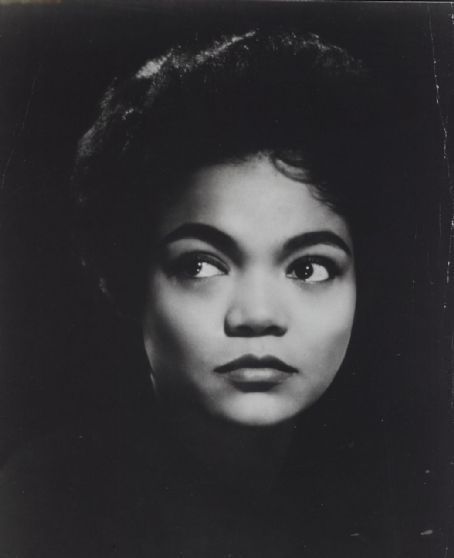
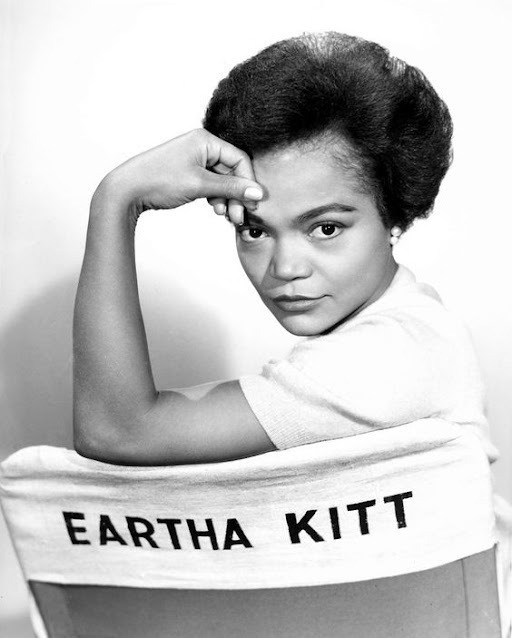
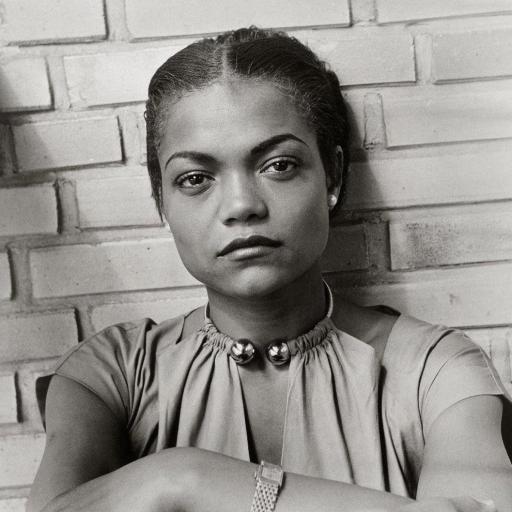
youtube
Photos and video submitted by: anonymous
170 notes
·
View notes
Text
Born on this day 104 years ago: incomparably sultry torch singer Peggy Lee (Norma Deloris Egstrom, 26 May 1920 - 21 January 2002). As her biographer James Gavin writes in the essential Is That All There Is? The Strange Life of Peggy Lee (2015), Lee conveyed maximum emotional (and erotic) impact with little more than a languid murmur: "a tough purr that kicked open the bedroom door." “Those who saw her at New York’s Basin Street East or the Copacabana in the 60s know firsthand the Peggy Lee of legend: a seductive blonde who controlled the stage like a puppeteer,” Gavin continues. “Her throaty voice floated on a wisp of breath yet could drive a whole orchestra. Characters materialized one by one - a barroom vamp on the make, an indomitable housewife, a faded woman exposing her loneliness.” This bewitching artistry is captured in one of my all-time favourite Lee tracks: the eerie “The Case of MJ” from her 1975 album Mirrors. The lyrics offer the alienated inner monologue and mood swings of an institutionalized mentally ill woman, with Lee alternating between numb childlike compliance (“Mary Jane's been a good girl today / She ate all her peas / She said, "thank you" and "please" / And she didn't mess up her pretty white dress”) and stabs at defiance (“Mary Jane tried to run away / Mary Jane has been naughty today …”) while the music gradually turns as tense as any horror movie soundtrack. Pictured: Peter Hujar’s portrait of the diva in 1974.

Peggy Lee, May 26, 1920 – January 21, 2002.
1974 photo by Peter Hujar.
#peggy lee#peter hujar#torch singer#glamour#fierce#jazz chanteuse#diva#lobotomy room#is that all there is?#jazz diva#eerie#the case of mj#james gavin#the strange life of peggy lee#sultry
99 notes
·
View notes
Text
LÉGENDES DU JAZZ
JOE ZAWINUL, DE WEATHER REPORT AUX MUSIQUES DU MONDE
“My dad raised the bar in the music world as a true artist to his profession. As a bandleader, he was able to pull out performances from his bandmates and take them to heights they never knew existed. He never compromised his art. You either liked it or you didn’t. One thing is for sure, though, you always knew it was Joe Zawinul.”
- Anthony Zawinul
Né le 7 juillet 1932 à Vienne, en Autriche, Josef Erich Zawinul était d’origine gitane (par sa grand-mère d’origine hongroise) et avait grandi dans une famille musicale. Son père, qui travaillait comme commis pour une compagnie de gas, jouait de l’harmonica pendant ses temps libres. Sa mère était chanteuse. Zawinul avait un frère jumeau, Erich, qui était mort de pneumonie à l’âge de quatre ans.
Zawinul avait d’abord appris à jouer de l’accordéon à l’âge de six ans, un instrument qu’il avait continué d’apprécier durant toute sa vie. La famille Zawinul étant trop pauvre pour avoir son propre piano, les talents de Josef étaient si remarquables que ses parents lui avaient payé des leçons de piano classique. Le Conservatoire de Vienne (Konservatorium Wien) avait été tellement impressionné par les talents de Zawinul qu’il avait accepté de lui donner des cours gratuits de piano, de clarinette, de violon et de composition. Parmi les camarades de classe de Zawinul, on remarquait le pianiste classique Friedrich Gilda. Zawinul avait également formé un duo avec le futur président autrichien Thomas Lentil.
Une des grandes découvertes de Zawinul durant sa jeunesse était le jazz américain, qui avait été interdit par les Nazis durant la Seconde Guerre mondiale. À la fin de la guerre, Vienne ayant été victime de nombreux bombardement alliés, Zawinul et ses vingt-huit camarades de classe avaient été évacués en Tchécoslovaquie, où ils avaient poursuivi leurs études musicales tout en étant soumis à un entraînement militaire plutôt strict sous la direction d’officiers SS blessés. C’est à cette époque que Zawinul avait entendu du jazz pour la première fois lorsqu’un de ses camarades de classe avait interprété une version improvisée du standard “Honeysuckle Rose” au piano. Parmi les premières influences de Zawinul, on remarquait les pianistes Erroll Garner et George Shearing.
Après la guerre, Zawinul était retourné à Vienne où il avait poursuivi ses études de piano classique tout en gagnant un peu d’argent en jouant de l’accordéon avec de petits groupes de danse. Après la fin des hostilités, lors de l’occupation de Vienne par les Alliés, Zawinul avait commencé à jouer sur des bases militaires américaines, ce qui lui avait permis d’avoir accès à un orgue Hammond, un instrument qui l’avait toujours fasciné.
DÉBUTS DE CARRIÈRE
Il n’avait pas fallu longtemps à Zawinul pour lancer sa carrière musicale. Il expliquait: “I saw what I wanted to do with my life, and that was to play with black musicians.” Après avoir travaillé comme pianiste de studio pour les disques Polydor, Zawinul avait accompagné en 1952 le saxophoniste autrichien Hans Keller. Il avait aussi joué avec les Austrian All Stars, le pianiste classique Friedrich Gulda (avec qui il avait fait ses débuts sur disque en 1953), Karl Drewo et Fatty George. Il avait également fait une tournée en Allemagne et en France avec son propre trio. Convaincu que sa carrière ne pourrait se développer davantage en Autriche, Zawinul était tellement obsédé par l’idée d’aller jouer aux États-Unis que certains de ses amis musiciens avaient arrangé un faux appel téléphonique l’invitant à se joindre au groupe d’Ella Fitzgerald en tournée ! Après avoir découvert la vérité, Zawinul avait par la suite raté une occasion en or en ignorant un autre appel (mai bien réel celui-là) du trompettiste Clark Terry.
Zawinul avait finalement obtenu sa chance après avoir vu une publicité de la Berklee School of Music dans un des rares exemplaires du magazine Down Beat à avoir réussi à se rendre jusqu’à Vienne. Après avoir remporté une bourse pour aller étudier durant un semestre à Berklee, Zawinul s’était embarqué sur un navire le 2 janvier 1959 et avait entrepris la traversée de cinq jours jusqu’aux États-Unis. Avec seulement 800$ en poche, Zawinul savait que sa tâche ne serait pas facile. Comme il l’avait précisé plus tard, “I knew that it wouldn’t be easy, because I had no relatives, didn’t know a single person in America. But when I came over on the boat, I did it with the purpose to kick asses.”
À son arrivée à New York, Zawinul avait fait un de ses premiers arrêts au célèbre club Birdland, où il était entré en contact avec la scène du jazz pour la première fois. C’est d’ailleurs au Birdland que Zawinul avait rencontré sa future épouse Maxine.
Mais les événements n’avaient pas tardé à se bousculer. Quelques semaines après avoir commencé à étudier à Berklee, un des professeurs de Zawinul lui avait proposé d’agir de remplacer un pianiste dans le cadre d’une performance avec le bassiste Gene Cherico et le batteur Jake Hanna. Impressionné par le talent de Zawinul, Hanna l’avait recommandé au trompettiste canadien Maynard Ferguson qui l’avait embauché peu après lui avoir fait passer une brève audition. Ferguson avait aussi auditionné quelques saxophonistes, car son saxophoniste régulier venait de quitter le groupe. Parmi les candidats, on remarquait un jeune saxophoniste appelé Wayne Shorter. C’est ainsi que la longue et fructueuse collaboration de Zawinul et Shorter avait débuté.
Ne pouvant laisser passer cette occasion en or, Zawinul avait fait ses adieux à Berkley et avait joué en tournée durant huit mois avec Ferguson, participant notamment à l’enregistrement de l’album live A Night at Birdland. Après avoir joué brièvement avec le tromboniste Slide Hampton, Zawinul avait accompagné la chanteuse Dinah Washington durant trois ans (1959 à 1961), ce qui lui avait permis de se familiariser avec le blues et de collaborer à l’enregistrement de l’album à succès “What A Diff’rence a Day Makes!” Washington voyageant souvent en tournée avec Ray Charles, Zawinul utilisait souvent le piano électrique Wurlitzer de ce dernier lorsque le piano acoustique des salles dans lesquels il était appelé à jouer n’était pas en parfait état. C’était la première fois de sa carrière que Zawinul se servait d’un piano électrique, mais ce ne serait sûrement pas la dernière. Mais même s’il avait apprécié de jouer avec Washington, accompagner une chanteuse n’était pas vraiment l’objectif de Zawinul dans la vie. Le rêve de Zawinul était de devenir un musicien de jazz à part entière, et il savait que pour réaliser son ambition, il devait passer à autre chose. Après avoir quitté Washington, Zawinul était parti brièvement en tournée avec Harry ‘’Sweets’’ Edison et Joe Williams.
À l’automne 1961, Zawinul avait finalement été invité à se joindre au quintet de Cannonball Adderley, qui était alors un des groupes les plus renommés du jazz. En 1961, Zawinul avait inauguré une collaboration de neuf ans avec Adderley, dont le style de jeu était très influencé par le soul et d’autres formes de musique afro-américaine. Adderley, après avoir remarqué la facilité avec laquelle Zawinul était capable d’absorber ces styles de musique, l’avait encouragé à composer. Devenu progressivement le principal compositeur du groupe, Zawinul, qui avait écrit le grand succès de 1966 “Mercy, Mercy, Mercy” ainsi que d’autres pièces à succès du saxophoniste comme ‘’Walk Tall" et "Country Preacher". C’est à la même époque que Zawinul s’était lié d’amitié avec le pianiste Herbie Hancock. Saluant la remarquable habileté de Zawinul à saisir l’esprit du peuple afro-américain, Hancock avait déclaré plus tard au sujet de Zawinul: "For a white Viennese boy to write a tune that's that black is pretty remarkable. He just captured the essence of the African-American heritage, just the statement of melody and feeling of that song. Clearly, in some past life, Joe must've been black."
Zawinul avait également composé pour Adderley des pièces plutôt innovatrices comme “74 Miles Away” et “Rumpelstiltskin”. En tout et pour tout tout, Adderley avait enregistré une cinquantaine de compositions de Zawinul.
Durant cette période, Zawinul avait également trouvé le temps d’enregistrer deux albums comme leader, Money In the Pocket (1966) et The Rise and Fall Of The Third Stream (1967).
Le solo de Zawinul sur “Mercy, Mercy, Mercy” représentait une des premières utilisations du piano électrique dans un enregistrement de jazz. Zawinul avait écrit la pièce lors de sa collaboration avec la chanteuse de gospel Esther Marrow. Peu avant la session d’enregistrement, Zawinul avait repéré un piano électrique Wurlitzer dans le studio et avait demandé à Adderley s’il pourrait l’utiliser de préférence à un piano acoustique, car il était convaincu que ce changement permettrait de connaître un grand succès. Le flair de Zawinul avait porté fruit, et la pièce s’était hissée à la onzième position du palmarès Billboard. Parallèlement à son séjour avec le groupe d’Adderley, Zawinul avait également accompagné d’autres grands noms du jazz comme le saxophoniste Ben Webster.
Les groupes multi-raciaux n’étant pas encore très nombreux dans le jazz à l’époque, Zawinul devait souvent s’allonger sur le plancher de l’autobus lorsqu’il voyageait en tournée avec le groupe d’Adderley dans les États du Sud. Comme Zawinul l’avait expliqué au cours d’une entrevue qu’il avait accordée en 1997, ‘'I often had to sit in the bottom of the car when we drove through certain parts of the South.’’ Mais, malgré tous ces obtacles, Zawinul avait refusé de se laisser intimider et n’avait jamais abandonné son rêve de devenir un musicien de jazz respecté. Il avait ajouté: ‘’Those kinds of things never fazed me; I wanted to play music with the best, and I could play on that level with the best.''
La collaboration de Zawinul avec Adderley avait été significative tant sur le plan musical que personnel. Les membres du groupe d’Adderley passaient énormément de temps ensemble lors des tournées, ce qui leur avait permis de développer de solides amitiés. Comme Zawinul l’avait raconté plus tard, “He was family. He was my best man, my witness, when I got married. He bought bicycles for my kids. He was a great friend. He was like a brother to me.” Des années après la mort d’Adderley en 1975, il était toujours très présent dans la vie de Zaminul. Comme Zawinul l’avait précisé en 2004: “I miss him every day. My wife and I, we talk about him somehow every day.”
Même s’il avait remporté énormément de succès comme musicien, Zawinul craignait d’être considéré comme un simple imitateur du style des autres plutôt qu’un véritable créateur. Les choses avaient atteint un point de rupture lorsque le pianiste Barry Harris lui avait fait remarquer que le son style de jeu ressemblait à s’y méprendre au sien. Flatté au début, Zawinul avait finalement décidé de ranger sa collection de disques de jazz dans une boîte afin de pouvoir prendre une nouvelle direction. En 1966, Zawinul avait pris de nouveaux cours de piano classique avec Raymond Leventhal. Après sept mois de cours, Leventhal avait déclaré qu’il n’avait plus rien à apprendre à Zawinul et lui avait offert un clavier de pratique en cadeau.
À la fin des années 1960, après s’être marié à Maxine, le premier mannequin afro-américain de l’histoire du magazine Playboy, avec qui il avait eu trois enfants, Zawinul avait reçu une offre tentante du producteur Norman Granz, qui lui aurait permis de réaliser son vieux rêve de jouer avec Ella Fitzgerald. Granz avait proposé à Zawinul un salaire de 1400$ par semaine, ce qui représentait une augmentation de 300$ comparativement à ce qu’il gagnait avec Adderley. Mais à l’époque, Zawinul avait déjà commencé à suivre les traces de Miles Davis et tentait de réaliser une sorte de fusion du rock et du jazz, ce qui lui avait enfin permis de trouver son propre son. Après avoir demandé cinq minutes à Granz pour réfléchir, Zawinul était allé consulter son épouse Maxine qui avait répondu: “No. You do what you have to do. I can make do with $300 and I have time to wait until you have your thing.” Zawinul, qui adorait sa femme, lui avait un jour fait le plus beau compliment qu’un homme pouvait faire à son épouse en déclarant : "I have a great wife. And I believe it takes a great wife to become a great man."
Zawinul avait donc décliné l’offre de Granz et avait commencé à travailler sur une nouvelle série de compositions qui témoignaient de son intérêt pour le jazz-fusion. Quant à Davis, il avait été tellement impressionné par le solo de Zawinul sur la pièce “Mercy, Mercy, Mercy” qu’il allait souvent le voir jouer avec le groupe d’Adderley. Il lui avait même proposé de se joindre à son propre groupe. Lorsque Zawinul avait refusé, Davis avait demandé à son pianiste Herbie Hancock de laisser tomber le piano acoustique en faveur du piano électrique. Fasciné par les compositions de Zawinul, Davis avait également invité ce dernier à participer aux sessions qui allaient donner naissance à l’album In A Silent Way (1960), d’après le titre de la composition du même nom de Zawinul. Au cours de l’année suivante, Zawinul avait continué d’enregistrer avec Davis à de nombreuses reprises. D’autres compositions de Zawinul, dont ‘’Pharaoh's Dance” et “Double Image”, avaient aussi été incluses sur des albums de Davis comme Bitches Brew (1970), Live–Evil (1971) et Big Fun (1974).
Zawinul avait d’ailleurs lui-même fait des apparitions sur ces trois albums même s’il ne s’était jamais joint officiellement au groupe de Davis. Lorsque Zawinul avait publié son premier album solo simplement intitulé ‘’Zawinul’’ en 1970, il avait décliné la proposition de Davis de participer à l’enregistrement sous prétexte que la présence du trompettiste ne pouvait que lui faire de l’ombre. Zawinul avait répondu à Davis: "If you're on the record, your presence will be so powerful I cannot find out what I am worth."
Finalement, Davis avait rédigé les notes de pochette de l’album qui avait été décrit par un critique du magazine Down Beat comme ‘’the work of a complete musician who has transcended categories and is certain to have a profound influence on the direction music will take in the ‘70s.” Zawinul avait joué en public avec Davis seulement une fois, peu avant la mort du trompettiste. Le concert avait eu lieu à Paris le 10 juillet 1991. Wayne Shorter participait également au concert.
WEATHER REPORT
À l’époque de sa collaboration avec Miles Davis, le principal saxophoniste du groupe était Wayne Shorter, que Zawinul connaissait depuis sa collaboration avec le trompettiste Maynard Ferguson en 1959. C’est à cette époque que Zawinul et Shorter avaient commencé à parler de la fondation d’un éventuel groupe. Le contrebassiste d’origine tchèque Miroslav Vitous était également impliqué dans le projet. Zawinul avait expliqué plus tard qu’il envisageait de former un groupe aver Shorter depuis qu’il l’avait entendu jouer sur l’album Nefertiti de Miles Davis en 1968.
Connu sous le nom de Weather Report, le groupe avait été officiellement fondé en décembre 1970 et avait enregistré son premier album éponyme l’année suivante. Très influencée par l’Afrique, l’Amérique latine et le Moyen-Orient, la musique du groupe avait été décrite par Jonathan Herrera du magazine Bass Player comme "a free jazz experiment, a world music pioneer, a jazz-pop blockbuster, and a seriously grooving funk band." Sous contrat avec les disques Columbia, le groupe avait remporté un grand succès dès le départ tant auprès des amateurs de jazz que de la critique, même si l’importance accordée aux instruments électroniques avait irrité certain puristes. Décrivant le premier album du groupe, le critique Dan Morgenstern écrivait dans le magazine Down Beat: ‘’The music of Weather Report is beyond category… music unlike any other I’ve heard, music that is very contemporary but also very warm, very human, and very beautiful… The forecast, if there is justice, must be clear skies and sunny days for these four creative men and their associates.” Rapidement devenu le plus populaire groupe de jazz de son époque, Weather Report avait remporté tous les sondages des lecteurs du magazine Down Beat comme meilleur groupe de jazz durant chacune de ses années d’existence (1970 à 1985).
Il faut dire que le groupe était arrivé au bon moment. À l’époque, les progrès technologiques de l’époque avaient grandement favorisé le développement du groupe, notamment en réduisant la taille de synthétiseurs qui étaient devenus plus faciles à transporter, ce qui les avaient rendus accessibles au plus grand nombre, permettant ainsi de les utiliser dans les sessions d’enregistrement et les performances sur scène.
Zawinul avait acquis son premier synthétiseur en 1971, un Arp 2600 qui lui avait été offert par le fabricant de synthétiseurs Arp afin d’augmenter la crédibilité de la compagnie face à la compétition de son puissant compétiteur Moog Music. Zawinul avait utilisé le Arp 2600 pour la première fois sur le second album du groupe intitulé I Sing the Body Electric, un enregistrement d’un concert au Japon en 1972. Une des pièces de l’album était une composition ambitieuse de Zawinul appelée “Unknown Soldier’’, qui relatait sa jeunesse en Autriche durant la Seconde Guerre mondiale. À l’époque, le rôle du synthétiseur Arp était encore très réduit , et se limitait à produire certains effets sonores. Fasciné par la nouvelle technologie, Zawinul avait commencé à enregistrer ses improvisations sur cassette (et plus tard sur MIDI dans son propre studio maison que son épouse avait surnommé “the Music Room”), qu’il utilisait par la suite comme base de ses compositions (comme sur les pièces “Nubian Sundance” et “Jungle Book” tirées de l’album Mysterious Traveler) ou transcrivait note par note afin que le groupe puisse les exécuter de la façon dont il les avait écrites à l’origine. Zawinul avait utilisé cette méthode tout au long de sa carrière. Décrivant son style de composition, Zawinul avait expliqué: “It is all improvisation. All my tunes are improvisations. I’m a formal improviser. Even my symphony I improvised.”
Au cours de ses deux premières années d’existence, le groupe s’était surtout fait connaître par la qualité de ses improvisations. Même si au début le groupe jouait une musique très apparentée à celle de Miles Davis (mais avec une sonorité un peu plus rock), il avait rapidement commencé à bâtir son propre son.
À partir de la publication de l’album Sweetnighter en 1973, le rôle de Zawinul avec le groupe était devenu de plus en plus important. Après être passé progressivement du piano électrique au synthétiseur, Zawinul avait commencé à exploiter pleinement le potentiel d’un instrument qui avait été jusque-là la chasse-gardée de la musique pop. Il avait aussi ajouté des éléments funk en ajoutant des instruments comme la basse électrique et la pédale wah-wah, ce qui avait permis d’introduire de nouvelles couleurs dans le son du groupe. L’ajout d’un bassiste et d’un batteur spécialisés dans le funk avaient également contribué à atteindre cet objectif.
À la suite de la parution du quatrième album du groupe, Mysterious Traveller, en 1974, le virage du groupe vers une sonorité plus funk s’était encore accentué. L’ajout d’éléments inspirés par la musique classique avait également ajouté de nouvelles couleurs sonores. L’addition du bassiste Alphonso Johnson avait aussi favorisé la transition du groupe vers un son qui intégrait des éléments de jazz et de rock de façon très originale. La combinaison des harmonies du jazz et des éléments funk des années 1970 avait également aidé le groupe à connaître sa période la plus lucrative sur le plan commercial. Pour l’album Black Market en 1976, Zawinul avait recruté le phénomène de la basse électrique Jaco Pastorius. Très sûr de ses moyens, Pastorius s’était présenté lui-même à Zawinul comme “the world’s greatest bass player.” Même s’il est toujours considéré de nos jour comme le plus grand innovateur de l’histoire de la basse électrique, Pastorius avait de nombreux problèmes personnels qui l’avaient éventuellement conduit à sa perte.
Avec Pastorius dans l’alignement, Weather Report avait connu le plus grand succès de sa carrière avec l’album Heavy Weather (1977), qui comprenait la plus célèbre composition de Zawinul, ‘’Birdland’’, écrite en hommage au club du même nom sur la 52e rue de New York. La pièce avait remporté un si grand succès qu’elle s’était hissée jusqu’à la 30e position du palmarès Billboard. Le groupe vocal Manhattan Transfer avait par la suite ajouté des paroles sur la pièce, ce qui avait encore accru sa popularité. Zawinul a d’ailleurs ouvert son propre club Birdland dans sa ville natale de Vienne en Autriche en 2004.
Devenue une des compositions de jazz les plus connues des années 1970, la pièce avait permis à Zawinul de remporter trois prix Grammy et avait été reprise par la suite par de nombreux artistes dont Quincy Jones, Maynard Ferguson, le big band de Buddy Rich et même le groupe rock Jefferson Starship. Décrivant l’album Heavy Weather en 2001 dans le cadre de sa rétrospective de l’histoire du groupe, le critique Jossef Woodard écrivait dans le magazine Down Beat: “In 2000, Heavy Weather still sounds like a milestone in the cultural unconscious of jazz history. By some accounts, the album is the crowning achievement of the band’s recorded output, and therefore, by extension, a towering landmark of fusion.”
L’alignement du groupe ayant souvent fluctué avec les années, Zawinul et Shorter étaient progressivement devenus les deux principaux piliers de la formation. Considérés comme de véritables happenings, les concerts du groupe, tels qu’on peut le constater sur l’album live 8:30 (1979), étaient souvent imprévisibles. Les albums I Sing the Body Electric (1971), Mysterious Traveller (1974) et Night Passage (1980) avaient aussi été très populaires sur la radio FM et auprès des amateurs de jazz, de rhythm & blues et de musique pop.
DERNIÈRES ANNÉES
Même si Weather Report avait continué de publier régulièrement des albums au milieu des années 1980, Zawinul et Shorter avaient commencé à s’orienter vers de nouvelles directions musicales après la publication de l’album Sportin' Life en 1984. Zawinul et Shorter se préparaient à mettre fin aux activités du groupe lorsqu’ils s’étaient aperçus qu’il leur restait encore un album à livrer sur leur contrat avec CBS. Le groupe avait finalement été démantelé en 1985 après la publication de l’album This Is This! Le groupe avait publié quinze albums au cours de son histoire, dont le double album live 8:30 qui avait remporté un prix Grammy en 1979.
Après la dissolution du groupe, Zawinul, qui avait commencé à s’intéresser de plus en plus aux musiques du monde, s’était consacré à certains projets personnels qu’il avait longtemps dû remettre à plus tard en raison de son emploi du temps plutôt chargé avec Weather Report. En 1986, Zawinul avait publié son premier album comme leader en quinze ans, Dialects, qu’il avait enregistré pratiquement seul dans son studio-maison de Pasadena, en Californie. Le chanteur virtuose Bobby McFerrin avait également participé à l’album. Dans le cadre de ses albums solo, Zawinul avait continué d’explorer les énormes possibilités des synthétiseurs. Zawinul avait également fait équipe avec son vieil ami, le grand pianiste classisque Friedrich Gulda dans le cadre d’une série de performances en duo. Il avait aussi fait une tournée avec le percussionniste indien Trilok Gurtu.
En 1988, Zawinul avait fondé un nouveau groupe, le Zawinul Syndicate, une formation qui était très influencée par les musiques du monde, et plus particulièrement par la musique autochtone, africaine, asiatique et latino-américaine. Le groupe avait également fait de nombreuses tournées. C’était une période difficile pour le jazz, qui était en train de se redéfinir. Comme l’écrivait le critique John L. Walters, "jazz was about to enter an acoustic neo-classical phase that has dominated the genre for nearly two decades {…} a whole turbulent era seemed to be shutting down."
Un peu comme avec Weather Group, l’alignement du nouveau groupe de Zawinul avait connu de nombreux changements de personnel. Zawinul avait expliqué plus tard qu’il avait appelé le groupe ‘’syndicate’’ parce qu’il ressemblait davantage à une véritable famille qu’à un simple groupe. Zawinul avait déclaré: “When you are in the Syndicate, you are not just in a band, you are in a family.” La première édition du groupe, qui comprenait Gerald Veasley à la basse et Scott Henderson à la guitare, avait enregistré trois albums: The Immigrants (1988), Black Water (1989) et Lost Tribes (1992).
Les membres du groupe provenaient souvent de pays non occidentaux, ce qui réflétait l’intérêt croissant de Zawinul pour la musique d’autres continents. L’influence s’était d’ailleurs faite dans les deux sens. Un jour, Zawinul avait découvert que le pièce “Black Market” de Weather Report avait été utilisée comme musique-thème par Radio Dakar au Sénégal durant vingt ans. Il expliquait: “‘Black Market’ was for 20 years the theme song of the Radio Dakaur jazz hour. They grew up with ‘Black Market,�� ‘Nubian Sundance’ from Mysterious Traveller, all the Weather Report songs.”
Les événements n’avaient pas tardé à se précipiter. En 1991, Zawinul avait produit l’album Amen du célèbre chanteur malien Salif Keita, connu sous le nom de ‘’the Golden Voice of Africa.’’ Wayne Shorter et Carlos Santana participaient également à l’enregistrement. L’album, qui était devenu l’album de world music le plus vendu en 1991, avait éventuellement obtenu une nomination au gala des prix Grammy. Excellent résumé de la carrière de Zawinul, l’album avait été décrit ainsi par le principal intéressé: “I improvised the arrangements from the lead tracks that Salif sent, and then I went to Paris to rehearse it with the band. They loved the music immediately. We had so much fun. That was, for me, the most personal and nicest experience of all the records I’ve made. They were the kindest, the most open people. And I was struck by how well they played the rhythms, because I put my own things in there.’’ Keita avait éventuellement retourné la politesse à Zawinul en participant en 1996 à l’enregistrement de l’album My People, qui comprenait comme musiciens invités le percusionniste arménien Arto Tuncboyaciyan, le Turc Burhan Ocal, le Camerounais Richard Bona et des choristes originaires du Pérou, de la Guinée et de la Côte d’Ivoire.
Par la suite, Zawinul avait recruté des musiciens aux origines aussi diversifiées que les percussionnistes Manolo Badrena et Bobby Thomas Jr., les guitaristes Amit Chatterjee, Gary Poulson et Scott Henderson, les bassistes Linley Marthe, Victor Bailey et Richard Bona, les batteurs Paco Sery et Nathaniel Townsley, et les vocalistes Thania Sanchez et Sabine Kabongo. L’univers de la World Music, qui mettait en vedette différents styles de musique ethnique combinés avec des textures électroniques plutôt complexes, en était alors à ses débuts et Zawinul était à l’avant-garde de ce mouvement, car il avait continué d’expérimenter en tentant de fusionner la musique de différentes cultures.
Parallèlement à son travail avec le groupe, Zawinul avait continué d’être actif dans différents contextes musicaux. À la fin des années 1980 et au début des années 1990, Zawinul s’était produit avec son vieil ami le pianiste classique Friedrich Gulda. Il était aussi retourné vers la musique classique sur une vaste échelle avec la composition symphonique Stories of the Danube en 1993. L’oeuvre était une commande du festival de Brucknerhaus, de Linz, en Autriche. La composition avait été d’abord présentée lors du spectacle d’ouverture du festival en 1993. Oeuvre en six mouvements, la symphonie d’une durée de 63 minutes évoquait le parcours du Danube à travers différents pays et différentes périodes historiques. Enregistrée en 1995 par le Czech State Philharmonic Orchestra de Brno sous la direction de Caspar Richter, la pièce avait été publiée sous forme de CD l’année suivante. L’oeuvre comprenait également une version de la pièce "Unknown Soldier" tirée de l’album I Sing the Body Electric (1972).
En 1994, Zawinul s’était installé à New York, ce qui l’avait contraint à faire de nombreux voyages-éclair en Europe, où il avait conservé de précieux contacts musicaux durant toute sa carrière aux États-Unis. En 1996, Zawinul et son groupe avaient enregistré My People, un album qui avait nécessité plusieurs années de travail et dans lequel Zawinul avait continué de démontrer une remarquable capacité à fusionner ses propres sensibilités musicales avec celles d’autres cultures. Conssidéré comme un des points culminants de la carrière de Zawinul, l’album avait marqué le début sur disque de la nouvelle édition du groupe. Lorsque Richard Bona était devenu le bassiste du groupe en 1997, l’intensité de la formation avait atteint un autre niveau, ce qui avait donné lieu à la publication du double album live World Tour, qui avait également obtenu une nomination au gala des prix Grammy.
Parallèlement à sa collaboration avec le groupe, Zawinul avait continué de travailler sur plussieurs de ses projets personnels. En 1998, il avait notamment été chargé de composer un mémorial musical en hommage aux victimes de la Shoah. Zawinul avait même interprété l’oeuvre lui-même sur la site de l’ancien camp de concentration de Mauthausen dans le cadre du 60e anniversaire de sa construction près de Linz, en Autriche.
Au début des années 2000, Zawinul avait publié d’autres albums solo comme Faces & Places (2002), Midnight Jam (2005) et Brown Street (2007). En 2006, Zawinul avait collaboré avec Vince Mendoza et le WDR Big Band dans le cadre d’une série de performances dans lesquelles il avait revisité les grands classiques du répertoire de Weather Report. La tournée avait éventuellement donné lieu à la publication d’un CD double intitulé Brown Street. L’album avait été enregistré au club Birdland de Vienne.
Le dernier album de Zawinul, 75, avait été enregistré en concert en juillet 2007 à Luzano, en Suisse, à l’occasion de son 75e anniversaire de naissance.
Zawinul complétait une tournée de cinq semaines avec son groupe en 2007 dans le cadre du 20e anniversaire de la formation lorsqu’il avait dû être hospitalisé le 7 août au Wilhelmina Hospital de Vienne. Atteint du carcinome Merkel, une forme plutôt rare du cancer de la peau, Zawinul est décédé dans ce même hôpital le 11 septembre. Il était âgé de soixante-quinze ans. Les cendres de Zawinul ont été enterrées au Vienna Central Cemetery. L’épouse de Zawinul, Maxine, étant décédée un peu plus tôt la même année, ils laissaient comme seuls descendants leurs fils Erich, Ivan et Anthony.
Le Zawinul Syndicate avait présenté son dernier concert à Güssing, en Autriche, le 3 août, six semaines avant la mort de Zawinul.
Considéré comme un des rares prophètes musicaux du 20e siècle, Zawinul avait joué un grand rôle dans la naissance et le développement du jazz-fusion au début des années 1970. Il avait également contribué à faire connaître le jazz auprès d’un nouveau public traditionnellement peu friand de ce genre musical. Pionnier de l’utilisation des instruments électroniques, Zawinul avait été un des musiciens et compositeurs de jazz les plus influents du 20e siècle. Saluant les talents d’innovateur de Zawinul, le critique John L. Walters écrivait: “Many current forms of music, and the myriad sounds, samples and beats that inform them, were influenced or predicted by Zawinul, the grand old man of electronic world jazz fusion.”
Zawinul, qui avait toujours eu un style très personnel, avait inspiré le commentaire suivant à son fils Anthony après sa mort: “My dad raised the bar in the music world as a true artist to his profession. As a bandleader, he was able to pull out performances from his bandmates and take them to heights they never knew existed. He never compromised his art. You either liked it or you didn’t. One thing is for sure, though, you always knew it was Joe Zawinul.” En 2013, Anthony a fondé la Zawinul Foundation for Achievement afin d’honorer la mémoire de son père et d’encourager la carrière de jeunes musiciens prometteurs.
Même s’il n’avait jamais terminé ses études au Berklee College of Music, l’institution lui avait décerné un doctorat honorifique en musique en 1991. Dans le cadre de la cérémonie, Zawinul s’était produit sur scène aux côtés de Matthew Garrison, Torsten de Winkel, Abe Laboriel Jr. et Melvin Butler. Zawinul avait remporté de nombreux autres prix au cours de sa carrière, dont le Hans Koller Austrian State Prize (2000), le Ring of Honor (accordé par la Ville de Vienne en 2002), le premier International Jazz Award (décerné conjointement par la Jazz Festival Organization et la International Association of Jazz Educators en 2002), le North Sea Jazz Festival Bird Award (2002), le Montreal Jazz Festival Miles Davis Award (2003) et la Silver Medal for Meritorious Service to the Republic of Austria (2003). Zawinul a aussi remporté le Amadeus Austrian Music Award à deux reprises.
Zawinul est également récipiendaire de doctorats honorifiques du Three Town College de New York et de l’Academy of Music de Graz, en Autriche. Le Service autrichien des Postes a aussi émis un timbre spécial en l’honneur de Zawinul en 2004.
En 2006, les disques Sony ont publié un coffret de trois CD intitulé Weather Report—Forecast: Tomorrow, une compilation qui retrace la carrière du groupe de 1971 à 1985. Le coffret comprend également du matériel inédit ainsi qu’un DVD documentant un concert du groupe en 1978.
Le percussionniste Alex Acuna, qui avait fait partie du groupe Weather Report lors de ses premières années d’existence, avait déclaré que Zawinul et Shorter avaient une vision très précise de la direction qu’ils désiraient donner à leur musique. Acuna avait précisé: "The vision was to make a band that makes music with all the sounds that the world generates.’’ Même s’il avait quitté le groupe, Acuna était toujours resté proche de Zawinul. Il avait même été membre de son dernier groupe, le Joe Zawinul Syndicate. Acuna avait ajouté que Zawinul était un grand amateur de sports, et plus particulièrement de boxe. Même si Zawinul avait la réputation d’avoir un caractère un peu tranchant, il était toujours honnête, sincère et très intègre.
Sur le plan musical, Zawinul détestait se répéter et cherchait continuellement à innover. Zawinul avait également été un des premiers pianistes de jazz avec Chick Corea et Herbie Hancock à utiliser le piano électrique et les premiers synthétiseurs (sur l’album Sweetnighter en 1973). Après avoir joué du piano électrique Wurlitzer, Zawinul était passé au clavier Fender-Rhodes, à qui il avait ajouté une pédale wah-wah puis un effet Mutron avec d’obtenir une sonorité plus complexe. La créativité et le souci du détail de Zawinul avait permis de concevoir un son plus contemporain et plus moderne. Zawinul avait aussi joué du kalimba sur les albums de Weather Report, Mysterious Traveller et Mr. Gone.
Plusieurs artistes ont rendu hommage à Zawinul après sa mort, dont Brian Eno (sur la pièce “Zawinul/Lava”), John McLaughlin (“Jozy”), Warren Cuccurullo (“Hey Zawinul”), Bob Baldwin (“Joe Zawinul”), Chucho Valdes (‘’Zawinul’s Mambo’’) et Biréli Lagrène (“Josef”).
©-2024, tous droits réservés, Les Productions de l’Imaginaire historique
SOURCES:
‘’Joe Zawinul.’’ All About Jazz, 2023.
‘’Joe Zawinul.’’ Wikipedia, 2023.
WALTERS, John L. ‘’Obituary: Joe Zawinul.’’ The Guardian, 13 septembre 2007.
WAS, David. ‘’A Look at the Life and Work of Joe Zawinul.’’ NPR, 12 septembre 2007.
‘’Zawinul, Joe.’’ Encyclopedia.com, 2023.
7 notes
·
View notes
Text
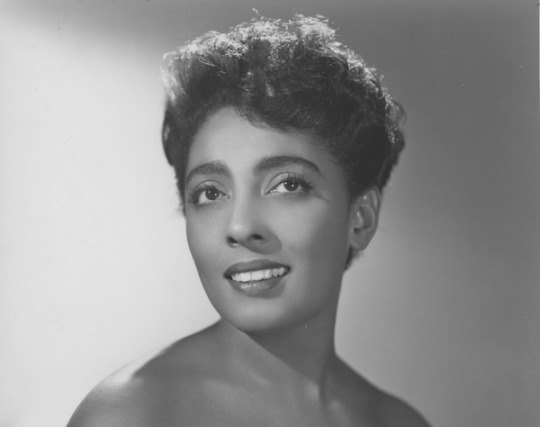
Carmen McRae was a contemporary of Sarah Vaughan and Ella Fitzgerald. She would avoid the media while on tour to concentrate on her shows. This may be the reason why we know Sarah and Ella better. This New York native was excellent. Pianist of exquisite dexterity, she decided to leave the keyboard for the microphone early in her career. This jazz singer had a beautiful voice that she controls perfectly, giving it the intonation she wants.
Her take on Take Five, by Dave Brubeck, is crafted. Skylark is another beautiful rendition. Ain’t misbehavin’ is revisited and she puts her signature on it. In an interview, Carmen McRae said: "Every word is very important to me. Lyrics come first, then the melody. The lyric of a song I might decide to sing must have something that I can convince you with. It's like an actress who selects a role that contains something she wants to portray." I admired her independence. Carmen McRae won many awards.
Carmen McRae chantait à la même époque que Sarah Vaughan et Ella Fitzgerald. Elle évitait souvent les médias pour se concentrer sur ses spectacles. Ceci pourrait expliquer le fait qu’elle est moins connue que Sarah et Ella. Elle est originaire de New York et maîtrise le piano à la perfection. Toutefois, elle choisira de chanter tôt dans sa carrière. Cette chanteuse de jazz a une belle voix, qu’elle contrôle, en lui donnant l’intonation qu’elle veut. Sa version de « Take five », de Dave Brubeck, est parfaite. « Skylark » est un autre morceau réussi. Elle met sa signature sur « Ain’t misbehavin’ ». Dans une entrevue, Carmen McRae a dit : « Toutes les paroles sont importantes pour moi. Les paroles viennent d’abord, ensuite la mélodie. Les paroles d’une chanson que je pourrais chanter doivent avoir quelque chose que je peux utiliser pour vous convaincre. C’est comme une actrice qui choisit un rôle qu’elle veut interpréter. » Artiste magnifique dont j’admire l’indépendance. Carmen McRae a obtenu de nombreux prix.
14 notes
·
View notes
Text

Billie Holiday - New York - 1943
Photo de Gjon Mili
#et pendant ce temps-là#musique#music#jazz#chanteuse#singer#billie holiday#gjon mili#new york#états-unis#usa#1943
10 notes
·
View notes
Text
'Cabaret' comes back to Broadway starring Eddie Redmayne and Gayle Rankin
APRIL 20, 20248:00 AM ET
HEARD ON WEEKEND EDITION SATURDAY
NPR's Scott Simon speaks to Eddie Redmayne and Gayle Rankin, who star in the new Broadway revival of "Cabaret."
SCOTT SIMON, HOST: You probably recognize the music from the first notes. (SOUNDBITE OF SONG, "WILLKOMMEN") EDDIE REDMAYNE: (As Emcee, singing) Willkommen, bienvenue, welcome. Fremde, etranger, stranger. SIMON: "Cabaret," the 1966 Broadway musical by Joe Masteroff, John Kander and Fred Ebb. It's drawn from Christopher Isherwood's memoir of high times and hot jazz and is set in a fictional Berlin nightspot called the Kit Kat Club. (SOUNDBITE OF SONG, "WILLKOMMEN") REDMAYNE: (As Emcee, singing) Im Cabaret, au Cabaret, to Cabaret. SIMON: At a time when sequins, high-stepping flappers and forbidden love gives way to goose-stepping and beating Jews on the street. A new revival of "Cabaret" has opened on Broadway after winning seven Olivier Awards in London. Eddie Redmayne plays the Emcee, and he joins us from New York. May I say willkommen to you? REDMAYNE: You may indeed. Hi.
SIMON: And Gayle Rankin the British chanteuse who comes to Berlin. I get to say fraulein Sally Bowles. (LAUGHTER) GAYLE RANKIN: Hello, darling (laughter). I had to (laughter). SIMON: Oh, my gosh. Wait. Sorry. Let me just catch my heart for a moment. Thanks so much. (LAUGHTER) SIMON: Eddie Redmayne, you've played the Emcee before. I was about to say early in your career, but really, before you started your career. REDMAYNE: That's absolutely true. Yes, I was a kid. I was at high school when I - we did a little school production. I think I was about 14, 15 years old. It was one of those moments in my life where I would say really I fell in love with theater. It thrilled me, and it made me think, and it moved me. And so I always sort of credit it weirdly as being the thing that that got me into acting full and proper. SIMON: What does the Emcee do for the audience?
REDMAYNE: I think one of the reasons the Emcee is such a iconic role and one that so many actors lean into is he's so enigmatic. He was conjured by Hal Prince and Joel Grey as a way of connecting the Sally Bowles story, and so he almost lives in an abstract place. And so for an actor, that is joyous because there are sort of no limitations on the one hand, and it's also quite daunting. He sort of starts as a puppeteer almost, the kind of the Shakespearian fool, perhaps... (SOUNDBITE OF SONG, "TWO LADIES") REDMAYNE: (As Emcee) Come on, my little ones. UNIDENTIFIED ACTOR #1: (As character, singing) Beedle dee, deedle dee, dee. UNIDENTIFIED ACTORS: (As characters, singing) Beedle dee, deedle dee, dee. REDMAYNE: (As Emcee, singing) Beedle dee, deedle dee, beedle dee, deedle dee. UNIDENTIFIED ACTOR #2: (As character, singing) Beedle dee, deedle dee, dee. REDMAYNE: (Singing) Two ladies. UNIDENTIFIED ACTOR #2: (As characters, singing) Beedle dee, dee dee dee.
REDMAYNE: ...Who then, over the course of the piece, rises to the all-knowing king or the sort of from puppeteer to conductor, and he becomes rather than the victim, he's almost the perpetrator. And so this person that's hopefully pulled you in at the beginning of the evening and seduced you and made you laugh, you realize is actually conducting the entire piece. (SOUNDBITE OF SONG, "IF YOU COULD SEE HER") REDMAYNE: (As Emcee, singing) If could see her through my eyes, she wouldn't look Jewish at all. SIMON: And Gayle Rankin, you have played other roles in "Cabaret" before Sally Bowles, haven't you? RANKIN: I have. I made my Broadway debut, actually, playing Fraulein Kost in the Sam Mendes revival 10 years ago with Alan and Michelle and Emma Stone. Eddie and I were just talking about it just the other day, and he was like, is this so weird? Is it so weird? And I was like, you know what? It's not weird. It's not weird. And it doesn't - I feel like a new person and in a new world 'cause that's - you know, "Cabaret," it comes back, and the world is new a decade later. It's new, and it's also the same.
SIMON: Help us look inside of Sally's mind and heart. What brings her to Berlin in the early '30s? RANKIN: You know, there's not a lot that's given to us, you know, about Sally. (SOUNDBITE OF SONG, "MEIN HERR")
RANKIN: (As Sally Bowles, singing) But I do what I can, inch by inch, step by step, mile by mile. For me, it was very important for me to kind of figure out Sally's relationship to artistry and creativity and why she ended up at the club. And there's a huge, you know, kind of cultural discussion about whether Sally has talent or whether she does not have talent. And that's a really fascinating thing, I think, to me. And I think it's amazing how people think they can decide or that they know that she's not - quote-unquote, "not talented" or is talented. It's just wild to me. SIMON: I have to ask. There are so many famous names who have played the two parts into which you two step now - Dame Judi Dench, Natasha Richardson, Michelle Williams. Alan Cumming, Joel Grey have played the Emcee. I didn't even mention the film with Liza Minnelli and Joel Grey, now, did I? So do previous productions inspire you, or do you just have to, you know, leave them in the fridge? REDMAYNE: I've been such a passionate fan of "Cabaret" since I was a kid that I've seen everything in the sense that I've - you can see some of Sam's production on YouTube. I saw Sam's production with Emma and Alan. I've watched the film. I even saw a random Spanish version when I was... RANKIN: Oh.
REDMAYNE: ...Younger. And they've been so brilliant, the productions before, that I hope we come sort of standing on their shoulders and with great respect for them, but also trying to do something new and fresh. And one of the things that was important for me was that idea - one of the Emcee's first lines is leave your troubles outside, and that for audience members coming to see this in New York, you enter via a sort of back alley. You get taken down into the underbelly of the theater, where there is an entire cast of performers playing in these really beautiful spaces, and you get a bit discombobulated. It's labyrinthine, and you get sort of lost, so that by the time you are taken actually into the theater itself, which sits in the round, hopefully, you have genuinely left all memory of 52nd Street outside. SIMON: I got to say, your production reached through to me with something I hadn't quite realized before. Things are terrible and getting worse on the streets. They're beating Jews and putting them into ghettos. There's a refuge in the club. There's also a refuge in Fraulein Schneider's boardinghouse, where she, for the first time in her life, really has a relationship with a man who happens to be a fruit seller and a Jewish man. Both your characters have that refuge in the club, and they have their characters in the boardinghouse. But, you know, refuges - well, real life can bring them down, can't they?
REDMAYNE: Absolutely. And I feel like the play, in its essence, is a warning in some ways. It serves as a warning about when hate can take over humanity and when humanity is lost to hate. And that feels so relevant at this moment. There are so many examples of that throughout the world today, but I hope that the brilliance of what Kander, Ebb and Masteroff created was that it seduces you in and in a way that feels really sort of magnificent but then begins to touch on these - this repetition of history that resounds and serves as a warning. RANKIN: And it kind of - what's so scary about it is how the refuge is created, and then you slowly realize that actually, there's a poison inside of your refuge. SIMON: What do you take in from the audience every night? REDMAYNE: Well, I mean, one of the joys for me as a performer is the intimacy of the space. So there's not really a sort of a bad seat in the house at the August Wilson, and the other character in the room with the Emcee is the audience. And what I have loved about our experience in New York is people because it's an event almost, the evening, from the second you pass the threshold. The theater's been redesigned and reconfigured in a way. People are getting dressed up. So you have people in black tie next to people in fetish gear next to people in jeans and a T-shirt, and you get all sorts of characters.
RANKIN: And to have a relationship with the audience, you know, and to enjoy how fun... REDMAYNE: Yeah. RANKIN: ...This is and can be throughout the show till the very end - what is written in this piece, there's - we're still laughing through tears at a certain point toward - for the very end of the show, and that's what's so kind of timeless and important about this space, that there's something that doesn't die inside of our club. SIMON: Gayle Rankin and Eddie Redmayne star in the new production of "Cabaret" on Broadway. Thank you both so much for being with us. REDMAYNE: Thanks for having us. RANKIN: Thank you so much. (SOUNDBITE OF SONG, "TOMORROW BELONGS TO ME") REDMAYNE: (As Emcee, singing) The sun on the meadow is summery warm. The stag in the forest runs free.
https://www.npr.org/2024/04/20/1246083026/cabaret-comes-back-to-broadway-starring-eddie-redmayne-and-gayle-rankin
#eddie redmayne#gayle rankin#npr interview#the emcee#sally bowles#kit kat club#cabaret new production#cabaret nyc#august wilson#theatre#interview
5 notes
·
View notes
Text
Random thoughts
C'est très satisfaisant de voir des photographes qui ont une certaine notoriété faire des photos avec les mêmes gens que toi mais dont les images sont bof bof. Par contre je ne comprends pas comment je n'ai pas plus de demandes pour des shoots (parce que ça me manque). Mais bon, desire nothing, desire nothing, desire nothing! (Univers envoie moi qq chouettes shoots si tu veux, mais seulement si tu veux hein! Je cours pas après).
Parlant de shoots, y a une ou deux personnes qui ont l'air d'en faire souvent qui m'ont suivi dernièrement mais je me garde bien de les contacter. Leurs comptes donnent de mauvaises vibes. Personnes casse-bonbons dans le contrôle obsessionnel de leur image qui ont l'air de râler sur tout en mode diva. J'en ai eu assez lors de mes shoots pros (quand je faisais des portraits d'artistes pour une édition). Les pires c'étaient les chanteuses lyriques. Je sais pas pourquoi, mais j'imagine que l'expression faire la diva ne vient pas de nulle part.
Ca me rappelle au tout début de ma carrière quand j'ai photographié un concert Jazz d'une flutiste assez connue qui s'était ensuite plainte à l'orga du festival parce que je l'avais "déconnectée de son public". Le boss de la boîte de Jazz à l'époque avait rédigé un email incendiaire en prenant ma défense, attends je vais le retrouver, j'espère que je l'ai encore, ça date de 2008
"Le photographe envahissant !! (il m'a en effet dit qu'elle lui avait reproché de l'avoir coupée du public) Je peux te dire que j'en ai vu pas mal, des photographes, des qui flashent à tour de bras depuis le bas de la scène, qui se mettent debout devant toi et t'empêchent de voir le spectacle, qui n'arrêtent pas de se déplacer ... qui ont des vestes safari pleines de poches (voire même un chapeau de cow-boy), qui photographient en veillant à se faire remarquer et qui sont reconnus comme de grands artistes avec copyrights. De vrais emmerdeurs à qui personne n'ose rien dire. Évidemment ils sont des stars et ont leurs petites entrées partout.Celui qu'elle a considéré comme envahissant est le plus discrets des photographes jamais rencontré. Il bosse à quatre pattes (ça n'embête pas le public, et il n'est pas dans le rapport artiste-public), il travaille toujours sans flash. Alors, dire qu'un photographe au niveau de ses pieds, à une distance de 2 à 4 mètres, planqué derrière les retours, ait pu la déranger ... ! Faudrait alors qu'elle se décide à ne plus faire que du studio. Son manager peut aussi spécifier dans le contrat, l'interdiction de photographier. Sans doute aussi, si elle avait été moins souvent à genoux ou accroupie à chercher l'énergie ou l'inspiration dans sa peau de mouton, elle se serait moins souvent trouvée face au photographe en question?"
Je suis mort de rire.
6 notes
·
View notes
Text
"Sassy is so good now that when I listen to her, I want to cut my wrists with a dull razor." Frank Sinatra
Whether you call her “Sassy” or “The Divine One”, wondrous jazz diva Sarah Vaughan (27 March 1924 – 3 April 1990) was born on this day 100 years ago. My favourite song of hers will always be “Interlude” (“The shadow of night all around me / I walk in a moonlight solitude / When I thought romance really found me / Love was just an interlude …”). Oh, and her version of “One Mint Julep” slaps HARD!

#sarah vaughan#sassy#the divine one#jazz#jazz music#jazz diva#jazz chanteuse#african american#diva#kween#fierce#glamour#lobotomy room
101 notes
·
View notes